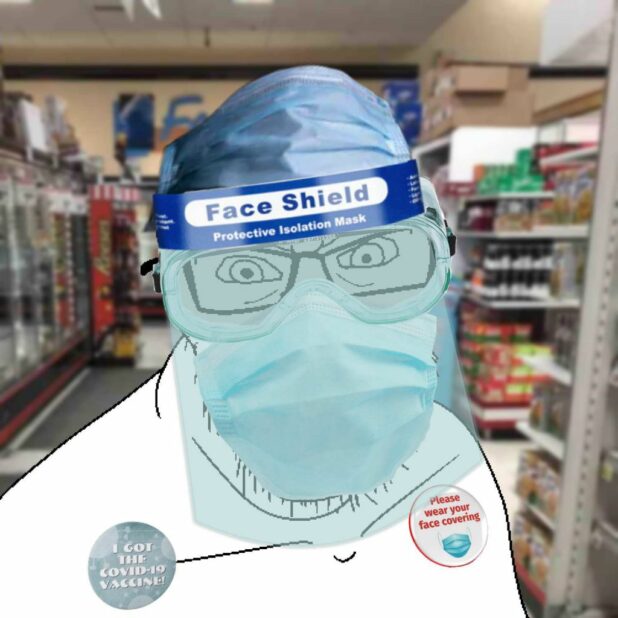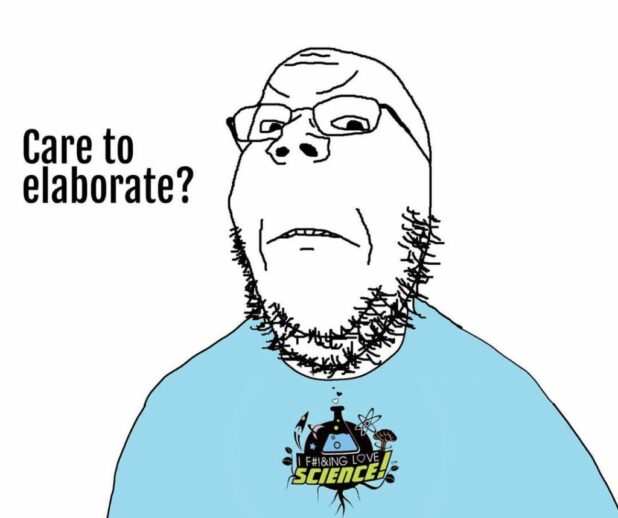The Science is on the ropes, being forced to admit that its schemes have failed.
Except actually, The Science planned this all along.
People who are fully vaccinated against Covid yet catch the virus are just as infectious to others in their household as infected unvaccinated people, research suggests.
Households are a key setting for the transmission of Covid infections (pdf), with frequent prolonged daily contact with an infected person linked to an increased risk of catching the virus.
However, questions have remained – including the true proportion of household contacts who become infected from an initial case, the duration of their infection, and the impact of vaccination on the risk of transmitting the virus and the chance of catching it.
The Science doesn’t really know anything then.
The Science is just throwing stuff against the wall to see what sticks as it continues to battle a virus that there is still no evidence even exists at all.
Now a study has revealed that while vaccination against Covid is crucial to preventing severe disease and death, even fully jabbed individuals catch the virus – and pass it on.
Writing in the Lancet, researchers from a number of institutions including Imperial College London and the UK Health Security Agency (HSA) report how they analysed data from 204 household contacts of 138 people infected with the Delta variant.
(Daily reminder that Imperial College London, which is funded by Bill Gates, came up with the initial fake models used by Fauci, who is funded by Bill Gates, claiming that millions of people would die if we didn’t go into lockdown, a plan created by Bill Gates. It turned out the models were all made before the coronavirus was supposedly identified.)
Of these contacts, who were recruited within five days of their household member showing symptoms and were tested daily for 14 days, 53 went on to become infected, 31 of whom were fully vaccinated and 15 were unvaccinated.
The results suggest even those who are fully vaccinated have a sizeable risk of becoming infected, with analysis revealing a fully vaccinated contact has a 25% chance of catching the virus from an infected household member while an unvaccinated contact has a 38% chance of becoming infected.
Remember that this is entirely based on PCR tests, and that in several different situations, The Science has used different PCR cycle counts on vaxed and unvaxed individuals. This entire new concept of “asymptomatic transmitter” (a concept that never existed before this, except with the HIV hoax) has made all data surrounding this supposed coronavirus completely meaningless.
However, the figures do not shed light on the severity of illness, while the team cautions these figures fall within a range of possible values, meaning the exact size of the difference is unclear.
The analysis further suggests that whether an infected individual is themselves fully vaccinated or unvaccinated makes little or no difference to how infectious they are to their household contacts.
The team add that the peak level of virus in infected individuals was the same regardless of whether they were jabbed or not, although these levels dropped off more quickly in the vaccinated people, suggesting they cleared the infection sooner.
“This likely explains why [fully vaccinated] breakthrough cases are as infectious to their contacts as [unvaccinated] cases” said Prof Ajit Lalvani, chair of infectious diseases at Imperial College London and an author of the study.
The team also looked more closely at those who were fully vaccinated.
“What we found, surprisingly, was that already by three months after receipt of the second vaccine dose, the risk of acquiring infection was higher compared to being more recently vaccinated,” said Lalvani.
“This suggests that vaccine-induced protection is already waning by about three months post-secondary,” he added.
Three months is not surprising, and is in fact what Hoax Watch predicted.
All the “vaccine” does – aside from cause permanent health problems and potentially a sudden death – is create antibodies for a common coronavirus, i.e., the common cold. Here’s a 2017 review of an article in Nature about why we cannot develop long-lasting antibodies for the common cold.
But of course, The Science planned this, which is why the main base of The Science’s hoaxes is now announcing that the vaccines are basically completely useless for their stated purpose.
The Science said the antibodies lasted 11 months, then they said 7 months, now they’re saying 3 months.
In the end, you’re probably going to be getting a booster every six weeks.



